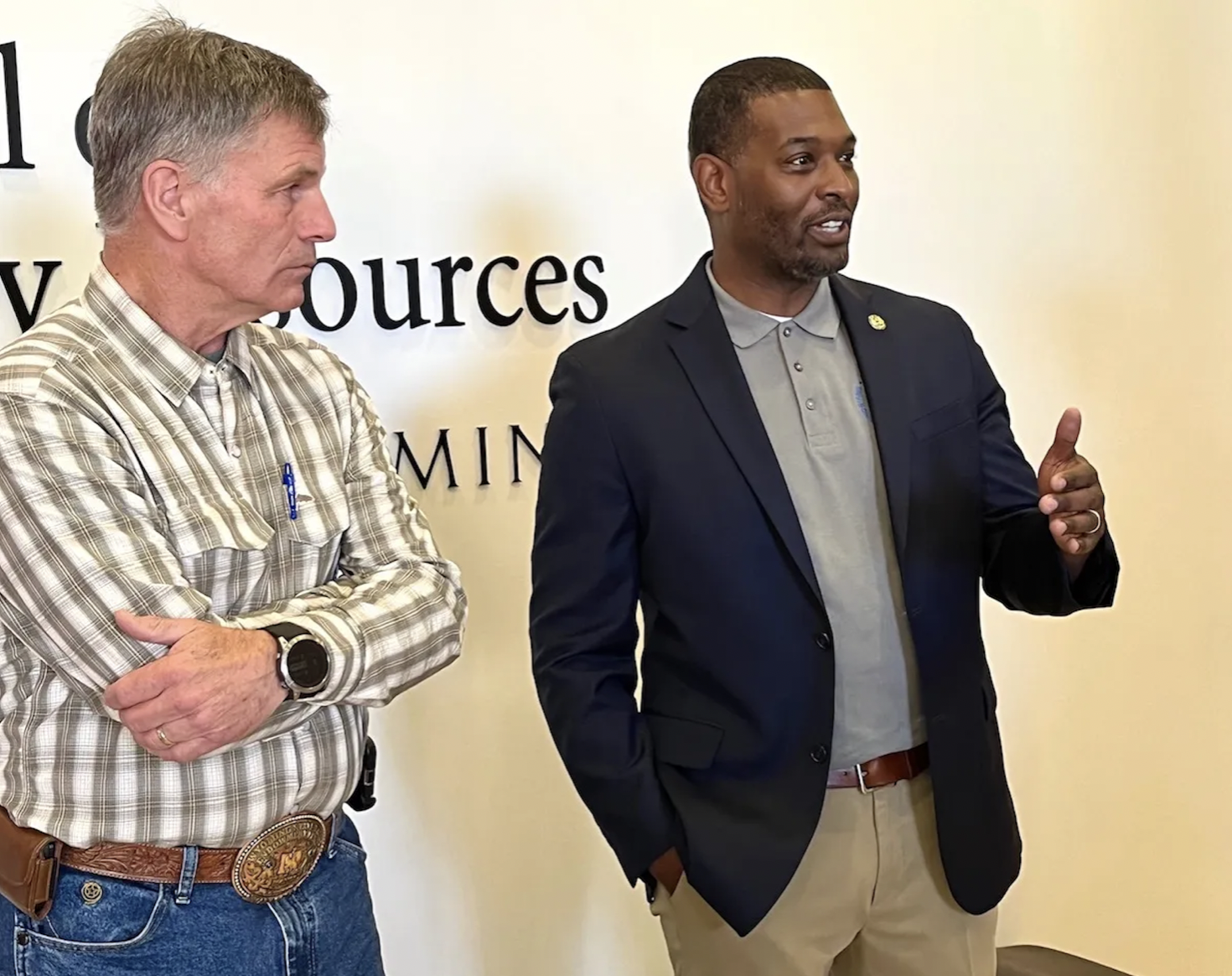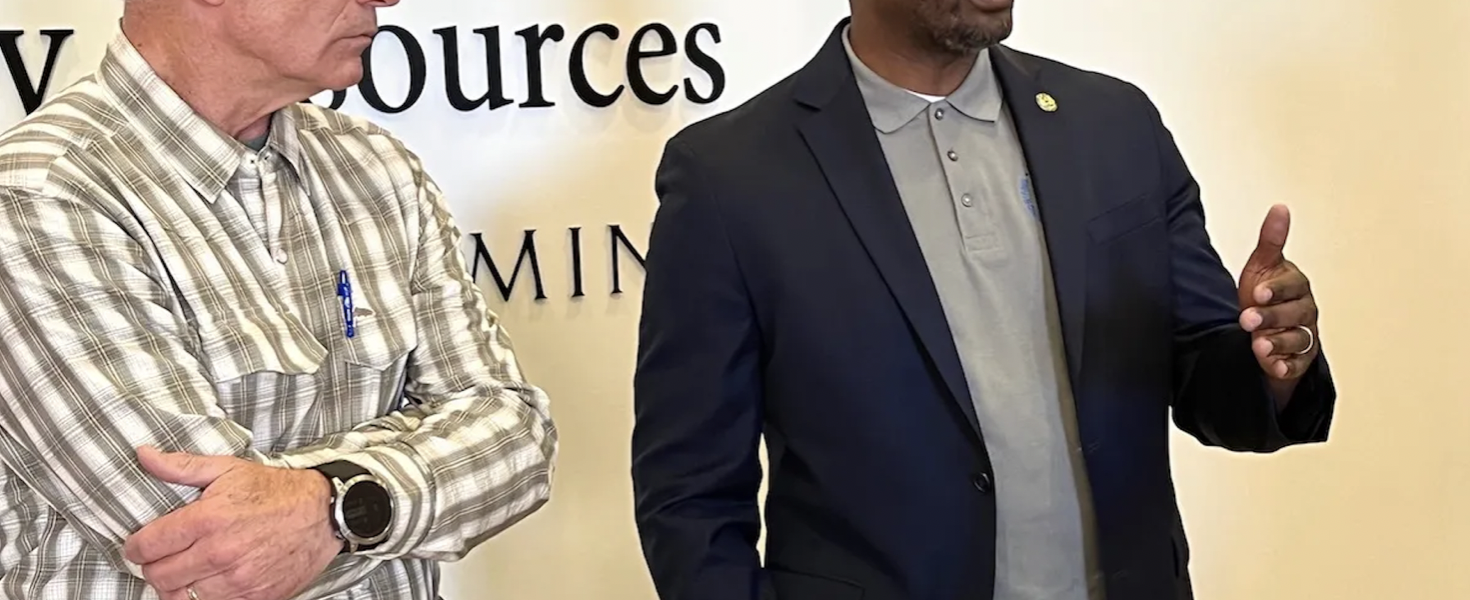
Both leaders tout Wyoming’s role in advancing carbon capture technologies, but state officials still critical of EPA’s ‘power plant rule.’
By Dustin Bleizeffer, WyoFile.com
LARAMIE—Gov. Mark Gordon and the state’s top environmental regulators are often at loggerheads with the U.S. Environmental Protection Agency, especially when it comes to fossil fuel emissions. But last week, Gordon and EPA administrator Michael Regan found room for agreement: Advancing carbon capture technologies is vital to sustaining reliable energy while combating the climate crisis.
“I think what we want to do is not lose focus on the fact that [Gordon] and others are leading the charge so that we can explore the viability of this technology,” Regan told reporters during a joint press conference Wednesday at the University of Wyoming. “We [EPA] also collectively believe that if we can perfect this technology domestically, it’ll put us in a globally competitive position to export this technology to other countries who have carbon-intensive economies,” Regan said.
Regan visited with Tribal leaders on the Wind River Indian Reservation earlier in the week and was joined by Gordon while touring the Integrated Test Center in Gillette and UW’s School of Energy Resources. Gordon said he shares the Biden administration’s sense of urgency to address the global climate crisis, and insists that coal can be part of the solution. Though he disagrees on the details of the administration’s climate measures, he said, Wyoming is on the same page when it comes to developing and deploying carbon capture technologies.
“We have to make sure that we can power the nation consistently and reliably over the future and understand that we can do that,” Gordon told reporters. “We really want to lead the climate charge. I believe we can do it within an all-of-the-above approach.”
Gordon and Wyoming’s Department of Environmental Quality disagree, however, on EPA’s claims that the technology can help existing coal-fired power plants capture 90% of carbon dioxide emissions by 2030, as proposed under the agency’s new carbon emission standards for power plants — commonly referred to as the “power plant rule.”
Power plant rule
The proposed power plant rule, rolled out in May, would require natural gas-burning plants to capture 90% of their carbon dioxide emissions by 2035, while existing coal-fired power plants would have to capture 90% of their carbon dioxide emissions by 2030. The new standards would “deliver up to $85 billion in climate and public health benefits over the next two decades,” according to the EPA.
Though “ambitious,” the proposed limits and guidelines are “based on proven and cost-effective control technologies that can be applied directly to power plants,” EPA said.
In May, Gordon described the proposal — as “altogether unworkable.” He wrote “one has to wonder if this administration has their heads in the sand to be so tone deaf. EPA must work with states on solutions that meet the needs of those states, rather than release edicts from afar that will destroy Wyoming jobs and communities, such as this proposed rule.”
Standing with Gordon at the University of Wyoming Wednesday, Regan reiterated that EPA is taking to heart that the rule — in whatever form it takes — shouldn’t be a “one-size-fits-all” approach. Advancing carbon capture technology, including its potential to reduce planet-warming emissions from existing coal plants, is integral to making the proposed rule work.
“In order to have a viable rule,” Regan said, “it’s important that we have these conversations with academic institutions, with coal [utilities] that are actively exploring this technology and with folks like the governor here who’s going to help inform how we apply this rule nationwide.”
For the past several years, Gordon and the Wyoming Legislature have claimed that capturing carbon dioxide from coal plants and pumping the liquidized gas into oilfields can can meet tighter restrictions on greenhouse gas emissions. In fact, the Legislature has passed seven laws since 2021 intended to force utilities with coal plants in the state to install carbon capture, use and sequestration systems rather than schedule coal plants for early retirement.
Despite the state’s legislative efforts and confidence in the technology, however, the EPA’s claims regarding carbon capture for coal plants are “highly problematic,” the Wyoming Department of Environmental Quality wrote in its comments to its federal counterpart. “EPA has not provided sufficient evidence to demonstrate that its proposed BSER [best system of emission reduction] technology will be readily available, and capable of the required performance, by the 2030 compliance deadline.”
The state also contends that the EPA’s public comment period — which opened in May and closed Aug. 8 — was woefully inadequate. “How can EPA possibly expect to receive comprehensive comments from technical experts when EPA does not provide a meaningful comment period?” DEQ wrote.
The power plant rule amounts to setting energy policy, therefore EPA’s proposal exceeds its authority, DEQ said. “Practically speaking, EPA is once again proposing a rule that mandatorily shifts [electric] generation from one type to another.”
Agreement
Gordon said his time with Regan in Wyoming was a continuation of a conversation the two have been engaged in for the past two years. They discussed the “practical implications” of the power plant rule and how it might be tweaked to accommodate Gordon’s “all-of-the-above” approach to energy and combating climate change, he said.
“I think Wyoming has decided that we want to participate in the climate solution,” said Gordon, who recently assumed chairmanship of the Western Governors’ Association and launched Decarbonizing the West as his priority initiative for the organization. “And as the solution requires getting rid of CO2 in the atmosphere, let’s focus on getting rid of CO2 in the atmosphere. Killing the coal industry only kills the coal industry.”
The EPA and Biden administration are focused on cutting greenhouse gas emissions, Regan said, stopping short of describing a climate emergency.
“Under the president’s leadership, we have both looked at opportunities through the Inflation Reduction Act and the Bipartisan Infrastructure Law to begin to adjust to the climatic impacts that we’re currently seeing — those that won’t be reversible anytime soon,” Regan said.
The approach of the power plant rule, Regan said, is to set standards that drive cleaner technologies. Not to pick and choose power sources.
“We believe that CCS [carbon capture and sequestration] is a viable technology for compliance,” Regan said. “But we also understand that there’s a lot of research and development that needs to go into this technology.
“The power plant rule, as proposed,” Regan added, “is designed to spark this conversation and to solicit comments from Wyoming and from North Carolina and Nevada. Again, because it’s not a one-size-fits-all, we need to have a really comprehensive technology standard that really takes into consideration the economies and the opportunities for all of these things and for all of our states to participate.”
WyoFile is an independent nonprofit news organization focused on Wyoming people, places and policy.





